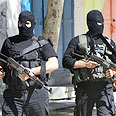
Palestinian gunmen in Gaza
צילום: איי אף פי
'Hamas losing support'
Palestinian pollster tells Ynetnews Gaza clashes costing Hamas popular support. Human rights activist adds: Gazans unsure they will return if they leave their homes
The gun battles and exchanges of mortars and explosives ravaging the streets of Gaza are costing Hamas popular support among Palestinians, a leading Palestinian pollster told Ynetnews on Tuesday.
Elias Kukali, of the Palestinian Center for Public Opinion (PCPO), based in the West Bank, said Fatah would naturally benefit from Hamas's decline.
"In general, Palestinians are against the fighting between the factions," Kukali said, adding that 78 percent of Palestinians were unaffiliated with either side.
With the exception of those who are partisan in favor of Hamas, "the majority of Palestinians are disappointed by Hamas, and feel that Hamas is incapable of running the government," the analyst added, citing a poll conducted by PCPO, due to be released in two days.
"For the time being, there are only two alternatives for Palestinians, and if they don't vote for Hamas, they will vote for Fatah," Kukali said.
Asked whether Hamas was trying push Fatah out of Gaza, Kukali said that such a goal was unfeasible, adding: "Every side has its support and power, and each wants more power than the other."
"There are people on both sides who benefit from the continuation of fighting," he added.
'Fighting resembles gang war'
Speaking from his mobile phone in Gaza, Jabar Washa, of the Palestinian Center for Human Rights (PCHR), told Ynetnews that the Hamas-Fatah war was "was more like a gang war than a battle between militants. We explicitly say that."
"I think this a factional clash motivated by self-interest," Washa said. "It's far away from the national interest. The national interest is to put an end to these clashes and to the suffering caused when militant groups attack," he added.
Washa said that the situation in Gaza has gotten so bad that the PCHR has had to close its office there.
"What concerns people here is the complete ambiguity and uncertainty, because uncertainty is more dangerous than danger," Washa said. "For the first time in the Palestinian Authority's existence we closed our office due to the curfews," he added. "People here expect the worst and they say that what we have now is bad enough," Washa said.
Asked how many people he estimated have been killed in the fighting, Washa replied that "there is no exact figure up to now because the situation is deteriorating. It's not a matter of how many, it's a matter of why. Even a single person who is killed or who is injured or victimized is a story. So I'm not in favor of counting casualties because every single human being has his her dignity should be respected."
"The most serious concern people here have is that they are uncertain that they will come back safely if they go out. So I think we are paying highly for this factionally-motivated conflict," he added.










